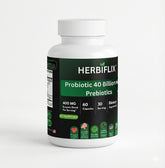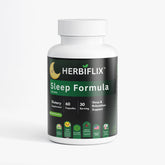Berberine vs. Chromium: Which Reigns Supreme for Blood Sugar Support?
In the ever-evolving landscape of health and wellness, managing healthy blood sugar levels has emerged as a cornerstone of overall well-being and metabolic health. As concerns about diet, lifestyle, and their impact on glucose metabolism grow, more individuals are turning to natural supplements to support their journey. Among the most talked-about contenders are Berberine and Chromium. Both are celebrated for their potential in blood sugar support, but how do they compare? As experts in natural health at Herbiflix, we're here to provide a scientific yet easy-to-understand breakdown.
Berberine: The Ancient Botanical Powerhouse
Berberine is a vibrant yellow alkaloid extracted from various plants, including Oregon grape, goldenseal, and barberry. It has a rich history in traditional Chinese and Ayurvedic medicine, where it was used for a variety of ailments. Today, modern science is validating its profound effects, particularly on metabolic health.
**How Berberine Works:**
Berberine’s mechanism of action is multifaceted and impressive, earning it a reputation as a comprehensive metabolic regulator. Its primary influence on blood sugar stems from its ability to:
- **Activate AMPK (AMP-activated protein kinase):** Often called the "master switch" for metabolism, AMPK activation is akin to exercise, improving glucose uptake by cells and reducing glucose production in the liver.
- **Improve Insulin Sensitivity:** Berberine helps cells respond more effectively to insulin, ensuring glucose is utilized rather than accumulating in the bloodstream.
- **Support Gut Microbiome Health:** Research suggests Berberine can positively influence gut bacteria, which plays a crucial role in metabolism and inflammation.
- **Reduce Glucose Absorption:** It may help to slow the breakdown of carbohydrates in the gut, reducing the amount of glucose that enters the bloodstream after meals.
These actions combine to offer robust blood sugar support, making Berberine a highly researched ingredient for maintaining healthy glucose levels.
Chromium: The Essential Trace Mineral
Chromium is an essential trace mineral that the body needs in small amounts for various functions, most notably for carbohydrate and lipid metabolism. While not as widely recognized as major minerals like calcium or magnesium, its role in glucose regulation is significant.
**How Chromium Works:**
Chromium’s impact on blood sugar primarily revolves around its interaction with insulin:
- **Enhances Insulin Action:** Chromium is a key component of a molecule called chromodulin, also known as Glucose Tolerance Factor (GTF). GTF is thought to potentiate the action of insulin, making cells more receptive to its signals.
- **Supports Glucose Metabolism:** By improving insulin's effectiveness, chromium helps facilitate the transport of glucose from the bloodstream into cells, where it can be used for energy.
- **Aids in Macronutrient Metabolism:** Beyond glucose, chromium is also involved in the metabolism of fats and proteins.
Chromium is crucial for foundational metabolic processes, especially when it comes to supporting the body's natural insulin response.
Berberine vs. Chromium: A Head-to-Head Comparison
When comparing Berberine and Chromium for blood sugar support, it's not necessarily about one being "better" than the other in all contexts, but rather understanding their distinct roles and strengths.
* **Scope of Action:** Berberine offers a broader, more comprehensive approach to metabolic health. Its activation of AMPK impacts multiple pathways, from glucose uptake to liver function and gut health. Chromium, while essential, has a more focused role primarily centered on enhancing insulin sensitivity.
* **Potency for Blood Sugar Management:** For individuals seeking more pronounced effects on already elevated blood sugar levels, scientific studies often point to Berberine demonstrating a more significant impact due to its diverse mechanisms. Chromium is vital for maintaining normal function and can be highly beneficial for mild imbalances or as a foundational nutrient.
* **Availability:** Chromium is an essential dietary mineral, found in foods like broccoli, green beans, and whole grains. Berberine is not typically found in the standard diet and must be obtained through supplementation.
Who Should Consider Which?
* **Consider Berberine if:** You are looking for comprehensive metabolic support, have more significant blood sugar fluctuations, or are seeking a natural ingredient with a wide array of benefits for metabolic health, including cardiovascular support and weight management. Our premium
Herbiflix Berberine HCL 1200mg is formulated for maximum effectiveness and purity.
* **Consider Chromium if:** You are looking for foundational support for healthy glucose metabolism, want to ensure adequate intake of an essential trace mineral, or have mild blood sugar concerns. Chromium can also be an excellent complementary nutrient alongside other metabolic support supplements.
The Herbiflix Approach to Blood Sugar Support
At Herbiflix, we believe in empowering your health journey with high-quality, scientifically-backed supplements. Both Berberine and Chromium offer distinct benefits for blood sugar support and metabolic health. For many, a holistic approach that includes a balanced diet, regular exercise, and targeted supplementation can yield the best results.
While Berberine often "reigns supreme" for its potent and multifaceted impact on blood sugar and broader metabolic health, Chromium remains an indispensable trace mineral for basic glucose metabolism. The best choice ultimately depends on individual needs and health goals. We always recommend consulting with a healthcare professional before starting any new supplement regimen to determine the most appropriate course of action for your unique health profile. Prioritize your metabolic health – your body will thank you for it.





